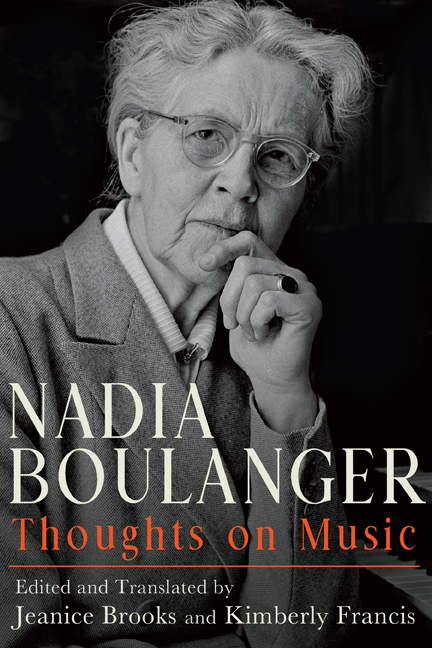Book contents
- Frontmatter
- Contents
- List of Illustrations
- Acknowledgments
- Editorial Apparatus and Critical Notes
- Note on Translations
- List of Abbreviations
- Timeline of Nadia Boulanger’s Life
- Introduction
- Part One Journalism, Criticism, Tributes
- Part Two Lectures, Classes, Broadcasts
- Bibliography of Nadia Boulanger’s Published Writing
- General Bibliography
- Index
“Le miracle de Toscanini” Spectateur 2, no. 55 (June 18, 1946): 3 (complete text)
Published online by Cambridge University Press: 15 October 2020
- Frontmatter
- Contents
- List of Illustrations
- Acknowledgments
- Editorial Apparatus and Critical Notes
- Note on Translations
- List of Abbreviations
- Timeline of Nadia Boulanger’s Life
- Introduction
- Part One Journalism, Criticism, Tributes
- Part Two Lectures, Classes, Broadcasts
- Bibliography of Nadia Boulanger’s Published Writing
- General Bibliography
- Index
Summary
Music comes to life only at the moment it is performed, when, to borrow Stravinsky's expression, it is “transmitted.”
It is therefore at the mercy of the performer, whose greatest accomplishment is to disappear in favor of the music.
What the most demanding imagination hardly dares to hope for in this area is realized to complete perfection by Mr. Toscanini with invincible mastery and conviction.
What is the origin of such power that achieves ease through rigor, simplicity through effort, and freshness through an unbending focus? By what grace or virtue does this power make what is controlled and ordered through unwavering will and lucidity appear spontaneous and intuitive?
How is such presence of mind compatible with such love?
Certainly, many gifts were bestowed upon Toscanini, but what he has made of them is simply prodigious. And therein lies the secret of his greatness.
His ear, his rhythm, his memory, his sensitivity, his energy are legendary. Which natural qualities did he not receive a share of?
Has he ever basked in the facility they bestowed upon him, in the privileges they brought him? A feeling of responsibility dominates his long and noble existence. A conscience that knows no rest and tolerates no weakness, that neither pardons nor forgets any fault and tirelessly judges itself, are true characteristics of this exemplary artistic life. It is perhaps to his conscience, too, that Arturo Toscanini owes his stunning youthfulness, his constant renewal. It keeps him invariably alert, showing itself seldom satisfied, caring little for previously achieved results, drawn toward that which will require new effort, without ever ceasing.
One must see Mr. Toscanini conduct a rehearsal to understand the demands of this conscience, which is horrified by vagueness, sets things in order everywhere, and does not accept compromise. The man is entirely present, concentrated on his ever-attentive ear.
Nothing can distract him; he is focused on the work from the moment before the first note until the moment following the last. He sees, remembers, and anticipates everything. A passionate love inspires him. Integrity, dignity, modesty, precision, clarity all come together in him.
- Type
- Chapter
- Information
- Nadia BoulangerThoughts on Music, pp. 233 - 234Publisher: Boydell & BrewerPrint publication year: 2020



